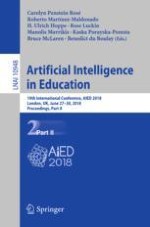2018 | OriginalPaper | Buchkapitel
Mitigating Knowledge Decay from Instruction with Voluntary Use of an Adaptive Learning System
verfasst von : Andrew J. Hampton, Benjamin D. Nye, Philip I. Pavlik, William R. Swartout, Arthur C. Graesser, Joseph Gunderson
Erschienen in: Artificial Intelligence in Education
Aktivieren Sie unsere intelligente Suche, um passende Fachinhalte oder Patente zu finden.
Wählen Sie Textabschnitte aus um mit Künstlicher Intelligenz passenden Patente zu finden. powered by
Markieren Sie Textabschnitte, um KI-gestützt weitere passende Inhalte zu finden. powered by
